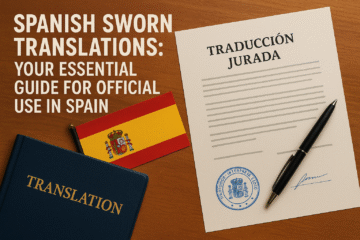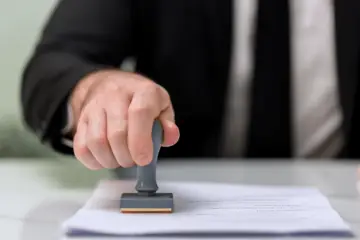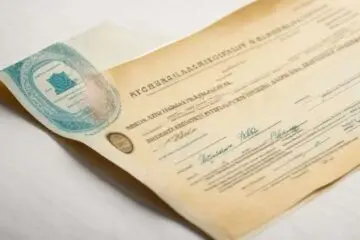When traveling abroad for work, study, residency, or marriage, certain legal documents must be authenticated for use in foreign countries. An apostille is an official certification that verifies the authenticity of a document issued in one country so it can be legally accepted in another. Many governments, employers, and institutions require apostilled documents to prevent fraud and ensure that records are legitimate. Understanding the apostille process can help you avoid delays and ensure that your documents are properly recognized overseas.
What Is an Apostille?
An apostille is a specialized certificate that authenticates a public document for international use. It confirms that the document has been issued by a legitimate authority and that its signatures, stamps, or seals are valid. The Hague Apostille Convention of 1961 established this process to simplify document legalization among member countries. If a country is part of the Hague Convention, an apostille is the only form of authentication needed for the document to be accepted.
If the destination country is not a Hague Convention member, additional embassy or consular legalization is required after obtaining the apostille. Non-Hague countries have stricter requirements, including certification from the U.S. Department of State and legalization at the foreign embassy.
Why Do You Need an Apostille for Travel?
Many foreign governments require apostilled documents for visa applications, work permits, study abroad programs, business transactions, marriage registrations, and residency applications. Without an apostille, documents may not be legally recognized in the destination country. Some of the most common reasons travelers need apostilled documents include applying for long-term visas, proving marital status for international marriage registrations, securing employment abroad, enrolling in foreign universities, conducting business in another country, and completing international adoption procedures.
Which Documents Need an Apostille for Travel?
The types of documents requiring an apostille vary depending on the purpose of travel. Common documents that often need apostille certification include birth and marriage certificates, divorce decrees, adoption papers, criminal background checks, university diplomas and transcripts, professional licenses, and business incorporation documents. Each country has specific requirements, so it is important to verify which documents need an apostille before starting the process.
Step-by-Step Guide to Getting an Apostille for Travel
Step 1: Obtain a Certified Copy of the Document
Before requesting an apostille, the document must be properly certified. Some documents, such as birth and marriage certificates, must be obtained directly from the state vital records office. Educational documents like diplomas and transcripts must be certified by the issuing school or university. Business and corporate records require certification from the Secretary of State in the state where the business is registered. If a document is not originally certified, a notary public may need to notarize a copy before proceeding.
Step 2: Identify the Correct Apostille Authority
The authority responsible for issuing an apostille depends on whether the document is state-issued or federal. For state-issued documents such as birth certificates, marriage certificates, and diplomas, the Secretary of State’s office in the state where the document was issued is responsible for providing the apostille. For federal documents such as FBI background checks, federal court documents, and immigration records, the apostille must be obtained from the U.S. Department of State Office of Authentications in Washington, D.C.
Step 3: Submit the Apostille Request
After identifying the correct office, the document must be submitted with a completed apostille request form and the required processing fee. Some states allow online requests, while others require submission by mail or in person. Federal apostilles for FBI background checks and other federal records must be sent to the U.S. Department of State by mail.
Step 4: Pay the Processing Fee
Each state sets its own fees for apostille services, typically ranging from $10 to $25 per document. The U.S. Department of State charges a standard fee for federal apostilles, which varies based on processing speed and document type. Payment is usually accepted in the form of money orders, credit cards, or cashier’s checks.
Step 5: Receive the Apostille Certification
Processing times vary depending on the issuing agency. State apostilles typically take 5 to 15 business days, while federal apostilles can take several weeks. Expedited processing is available through third-party apostille services, which can complete the process in as little as one to three days.
What If the Destination Country Does Not Accept Apostilles?
If a country is not part of the Hague Apostille Convention, an apostille alone is not enough. The document must go through embassy or consular legalization, which involves multiple verification steps. The process includes obtaining certification from the state or federal issuing authority, submitting the document for authentication by the U.S. Department of State, and getting final legalization from the destination country’s embassy or consulate. Some non-Hague countries also require official translations of the documents into their native language.
Common Mistakes to Avoid When Getting an Apostille
One of the most common mistakes is submitting incorrect or uncertified documents. Apostilles can only be issued for official documents that have been properly certified. If a document is not issued by a recognized authority, the request will be denied. Another issue is applying to the wrong agency. State-issued documents must go through the Secretary of State, while federal documents require apostilles from the U.S. Department of State.
Timing is another crucial factor. Many visa applications require documents issued within a specific timeframe, often within three to six months before submission. Delaying the apostille process can result in expired documents that need to be reissued.
Translation errors can also cause delays. Some countries require apostilled documents to be translated into their official language. If translation is necessary, it must be done by a certified translator and may require separate notarization.
Final Steps Before Using Apostilled Documents for Travel
After receiving the apostille, travelers should review their destination country’s submission requirements to ensure the document meets all legal standards. Some embassies and immigration offices require apostilled documents to be submitted in a sealed envelope or accompanied by additional verification forms. Keeping multiple certified copies is recommended in case the original document is lost or additional copies are needed.
Conclusion
Getting documents apostilled for travel ensures they are legally recognized in foreign countries. First, understand if you need an apostille, notary, or both, and why. Whether for work, study, marriage, or residency, an apostille certifies that official documents are authentic and valid for international use. By following the correct submission process, verifying country requirements, and applying early, travelers can avoid delays and complications when submitting their documents abroad.
Also Read: FBI Background Checks for International Relocation
Frequently Asked Questions: Apostille Services for Travel
What is an apostille, and why do I need one for travel?
An apostille is a certification that authenticates the origin of a public document for use in another country. It’s commonly required for documents like birth certificates, marriage licenses, and powers of attorney when traveling to countries that are members of the Hague Apostille Convention.
Which documents typically require an apostille for international travel?
Documents often needing an apostille include birth certificates, marriage licenses, diplomas, transcripts, and powers of attorney. Requirements vary by country, so it’s essential to check with the destination country’s consulate or embassy.
How can I get my documents apostilled through Anshin Notary?
At Anshin Notary, we assist with the apostille process by verifying your documents and submitting them to the appropriate authorities. We offer both in-office and mobile services to accommodate your needs. Learn more about our apostille services.
How long does the apostille process take?
The processing time varies depending on the document type and the issuing state. It can generally take from a few days to a couple of weeks. We offer expedited services for urgent requests.
Do I need to notarize my documents before getting an apostille?
Some documents require notarization before they can be apostilled, especially if they are not official government-issued documents. We can guide you through this process and provide notarization services as needed.
Can Anshin Notary help with documents for countries not in the Hague Convention?
Yes, for countries not part of the Hague Convention, documents require a different authentication process, often involving embassy or consulate legalization. We can assist with these procedures as well.
Where are your offices located, and do you offer mobile services?
We have offices in Los Angeles and Beverly Hills and offer mobile notary and apostille services throughout the region. Contact us to schedule an appointment at your convenience.




0 Comments